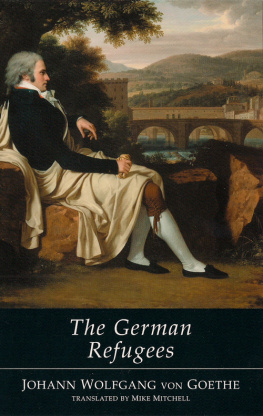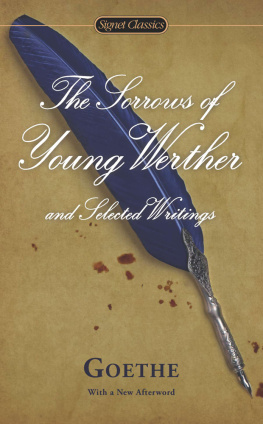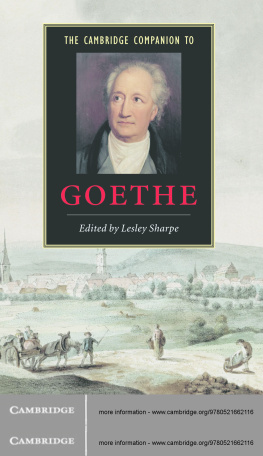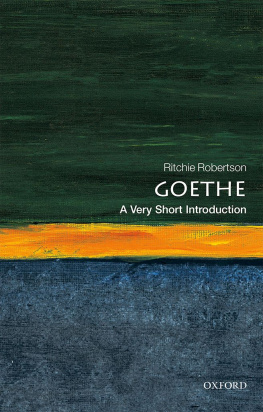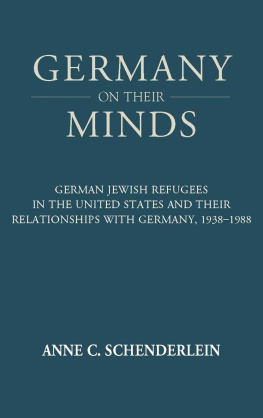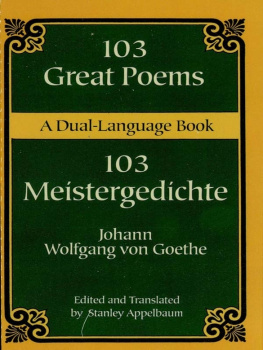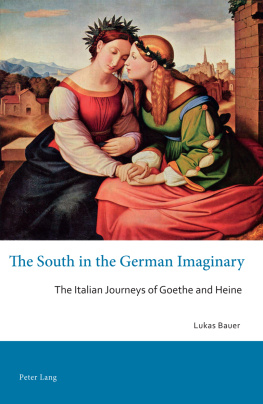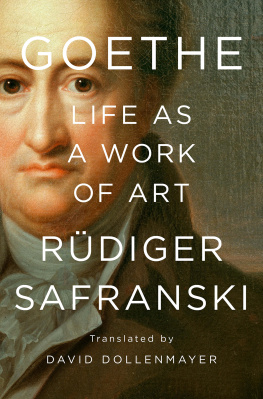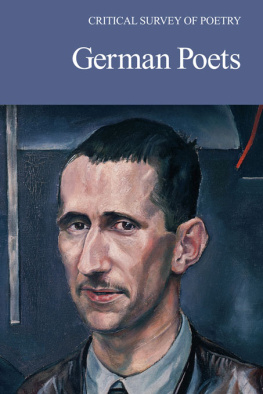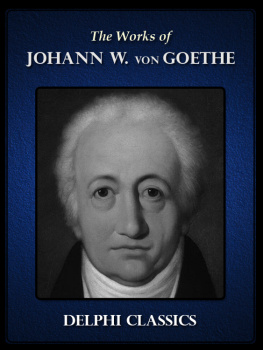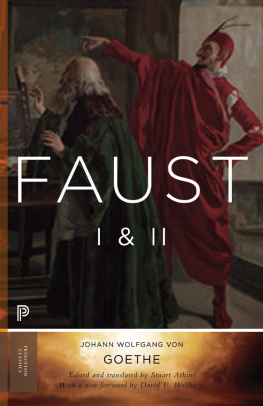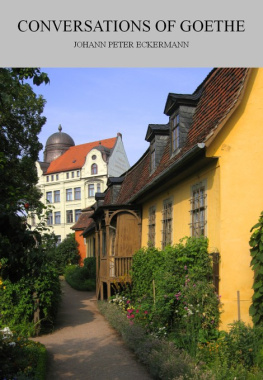
CONTENTS
For many years an academic with a special interest in Austrian literature and culture, Mike Mitchell has been a freelance literary translator since 1995. He is one of Dedaluss editorial directors and is responsible for the Dedalus translation programme.
He has published over fifty translations from German and French, including Gustav Meyrinks five novels and The Dedalus Book of Austrian Fantasy. His translation of Rosendorfers Letters Back to Ancient China won the 1998 SchlegelTieck Translation Prize after he had been shortlisted in previous years for his translations of Stephanie by Herbert Rosendorfer and The Golem by Gustav Meyrink.
His translations have been shortlisted three times for The Oxford Weidenfeld Translation Prize: Simplicissimus by Johann Grimmelshausen in 1999, The Other Side by Alfred Kubin in 2000 and The Bells of Bruges by Georges Rodenbach in 2008.
His biography of Gustav Meyrink: Vivo: The Life of Gustav Meyrink was published by Dedalus in November 2008. He has recently edited and translated The Dedalus Meyrink Reader.
1749 | born Johann Wolfgang Goethe in Frankfurt am Main, August 28 |
176568 | studies (rather reluctantly) law in Leipzig; after a serious illness continues studies in Strasbourg 177071; briefly a trainee at the court in Wetzlar (1772), but never practises as a lawyer |
177071 | love for Friederike Brion; early lyrics |
1771 | Frankfurt; Sturm und Drang drama Gtz von Berlichingen |
1772 | Wetzlar; love for Charlotte Buff, a friends fiance, provides material for Werther, 1774 |
1775 | April: engagement to Lili Schnemann, broken off in autumn; November: goes to Weimar at invitation of Duke of Saxe-Weimar; appointed to Weimar civil service in 1776 and remains in Weimar until death in 1832; first meeting with Charlotte von Stein, friendship to 1788 |
177686 | high-ranking official in Weimar, e.g.: 1779 head of commission for roads and war; 1782 ennobled; 1784 responsible for mines; scientific studies: mineralogy, anatomy, botany; lectures on anatomy, 1781; discovers intermaxilliary bone 1784; Metamorphosis of Plants, 1790; Theory of Colour, 1810; first version of Wilhelm Meister (1777), Iphigenie (1779) |
178688 | secretly leaves Carlsbad for Italy, stays away almost 2 years; beginning of his classicism: Iphigenie in verse form; Torquato Tasso; Roman Elegies |
1788 | returns to Weimar; responsibilities (apart from the mines) now mainly for science and the arts; meets Christiane Vulpius, their son born in 1789, they eventually marry in 1806 |
1790 | Faust, ein Fragment published |
17911817 | director of Weimar court theatre |
1792 | takes part, as member of Dukes entourage, in the campaign in France; 1793 observer at siege of Mainz |
1794 | The German Refugees |
17941805 | friendship with Schiller |
1796 | Wilhelm Meisters Years of Apprenticeship |
1797 | the ballad year during which he and Schiller wrote many of their best-known ballads |
1806 | Faust I completed; French occupy Weimar; meets Napoleon in 1808 |
1809 | Elective Affinities |
1811 | part one of autobiography Poetry and Truth (others 1812, 1813, 1830) |
1816 | death of his wife |
1819 | West-Eastern Divan |
1822 | The Campaign in France completed |
18251831 | Faust II |
1829 | Wilhelm Meisters Travels completed |
1832 | dies March 22 |
Goethes Unterhaltungen deutscher Ausgewanderten is generally mistranslated in English as the Conversations of German refugees. Although Unterhaltungen can, of course, mean conversations, in this book the word is generally used in the sense of amusements or entertainments, much along the lines of the old title of the Thousand and One Nights: The Arabian Nights Entertainments. What these entertainments might consist of is indicated by the Baroness, the head of the refugee household: talks on distant countries, their customs and traditions, or on ancient and modern history; poems read out; philosophical reflections on unusual stones, plants or insects brought back from a walk. They are the amusements of a cultured, leisured society and one of Goethes themes in the book is the nature of polite society.
In fact, however, what we have in this book is not the pastimes the Baroness lists, but a series of stories told by members of the group, together with their discussions about them. The German Refugees, then, is the first day of a German Decameron. There are seven stories in all: two ghost stories, two love stories, two moral tales and the fairy tale. Not all are original: the two love stories are taken, almost word for word, from the Mmoires du Marchal de Bassompierre and the story of the attorney adapts one from the Cent nouvelles nouvelles; the two ghost stories Goethe wrote following anecdotes he had heard from acquaintances; the story of Ferdinand and the fairy tale are original compositions. Goethe did plan a further volume, but never got round to writing it.
The situation is parallel to that in Boccaccio: a group of nobles in a country house on the right bank of the Rhine. The plague these German aristocrats have fled from is the French Revolution, which has driven them out of their home on the left bank of the river. And it is the Revolution that gives rise to the storytelling. Karl, a young firebrand, is a supporter of the ideals of the Revolution. This leads to such violent arguments with Herr von S., a high-ranking official, that the latter leaves in disgust, together with his wife, a childhood friend of the Baroness. The Baroness then reminds the group of the decorum which is essential if society is to function smoothly, bans political discussions and suggests they return to the cultured amusements of more peaceful times. The old priest offers some examples from his collection of tales, and starts the process by telling the first two stories.
Goethe had personal acquaintance with the disruption caused by the revolutionary wars. (He used it as the background to another work, one of his most popular, the epic poem Hermann and Dorothea.) The Duke of Saxe-Weimar was a Prussian general and Goethe participated in two campaigns as a member of his entourage. In his account of his experiences, The Campaign in France, he claimed to have told the others, when the coalition forces were repulsed by the French at Valmy in 1792, Here and today a new era in the history of the world has begun, and you can say you were there. He was merely an observer, though he did step in when the French withdrew after the siege of Mainz (1793) to stop the locals attacking a German Jacobin who was leaving with them. In
Next page
